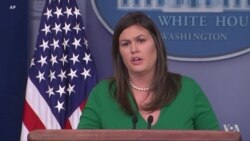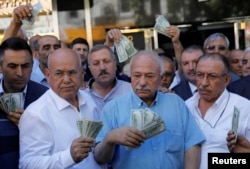The White House on Wednesday condemned Turkey for boosting tariffs on U.S. imports, the latest confrontation between the two NATO allies.
Ankara imposed stiffer levies on U.S. cars, alcohol, coal and other products — $533 million in new tariffs — in response to U.S. President Donald Trump's imposition of doubled tariffs on Turkish steel and aluminum exported to the United States.
The tit-for-tat tariffs came amid Turkey's rejection of a U.S. demand that it release American pastor Andrew Brunson, detained on espionage and terrorism-related charges.
WATCH: US-Turkey feud
White House spokeswoman Sarah Huckabee Sanders said "the tariffs from Turkey are certainly regrettable and a step in the wrong direction. The tariffs that the United States placed on Turkey were out of national security interest. Theirs are out of retaliation."
Sanders said even if Brunson is released, U.S. tariffs on steel would remain.
She said Turkey had treated Brunson "who we know to be a very good person and a strong Christian who has done nothing wrong, very unfairly, very badly, and it's something that we won't forget."
With the dispute between the U.S. and Turkey seeming to escalate by the day, the value of Turkey's lira currency against the dollar has plummeted, but Sanders rejected any blame on the U.S.'s part.
She said the U.S. was "monitoring the situation." But she added that Turkey's economic problems "are a part of a long-term trend, something of its own making and not the result of any actions the United States has taken."
The new Turkish tariffs came a day after President Recep Tayyip Erdogan said his country would boycott U.S. electronic goods, singling out Apple's iPhones. Erdogan has blamed the U.S. for the fall of the lira, but refused to budge on Trump's demand for Brunson's release.
Meanwhile, Qatar said it would make a $15 billion investment in Turkey to help the country's ailing economy.
The investment, which will be directed to Turkey's banks and financial markets, was announced after Qatar's Sheikh Tamin bin Hamad Al Thani held talks in Ankara with Erdogan.
Erdogan's economic role
Turkey's lira has plummeted nearly 40 percent this year due to concerns over Erdogan's growing influence on the economy. The lira has recovered somewhat from recent lows as the government cut the daily limit in the exchange of currencies with foreign countries.
Turkey and Qatar historically have been good diplomatic partners. Turkey supported Qatar after Saudi Arabia and other Arab countries cut diplomatic, trade and travel ties with Qatar last year. The Arab states accused Qatar of financing terrorism, a charge Qatar denies.







